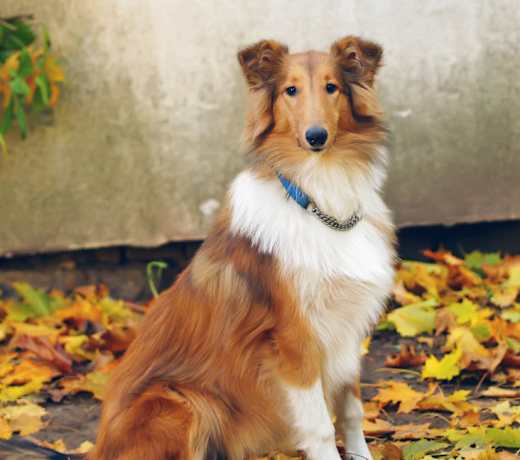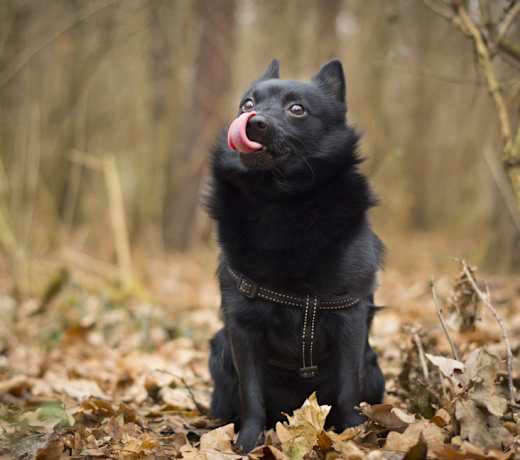Shelties typically stand between 13 to 14 inches tall at the shoulder and weigh between 12 to 24 pounds once fully grown.
Shetland Sheepdog
Breed Type: Herding
Common nicknames: Sheltie, Scotch Collie
Coat: Double
Hypoallergenic: No, they will likely trigger allergies.
Temperament: Alert, intelligent, loyal, affectionate
Life expectancy: 12-15 years
Color & patterns:

Shetland Sheepdogs, also known as “Shelties,” are herding dogs known for their keen intelligence, stunning looks, and boundless energy. Shelties, who are often referred to as “miniature collies” due to their resemblance to their larger cousins, have fluffy coats and perky ears that are sure to turn heads on the street. They are known for their sweet, affectionate, and gentle natures, making them popular among families with children. Shelties are also known for their incredible work ethic — they excel in agility, obedience, and herding competitions — but are also playful, loyal, and love nothing more than spending time with their human families.
Shetland Sheepdog characteristics
Learn about about Shetland Sheepdog basics like their fur colors, shedding levels, how much grooming they need, and other Shetland Sheepdog facts.
Average height
13-14 inches (33.0-35.6cm)
Average weight
12-24 pounds (5.4-10.9 kg)
Average lifespan
12-15 years
Exercise needs
Grooming needs
Full-grown size
Good with cats
Good with kids
Training aptitude
What does a Sheltie look like?
A Sheltie is a medium-sized dog with a long, flowing double coat. They have a wedge-shaped head with almond-shaped eyes and small, erect ears. Their fur can come in various colors such as sable, tricolor, blue merle, and black with white markings.
Do Shelties shed?
Yes, Shelties shed. They have a dense double coat that sheds moderately year-round, and they also blow their coat twice a year, typically in the spring and fall. Regular grooming can help manage the shedding and keep their coat in good condition.
When do Shelties ears stand up?
Sheltie puppies’ ears typically start to stand up between three to five months of age. Some puppies’ ears might take a bit longer to stand fully erect, but by the time they’re fully grown, their ears should be upright. If you notice that a Sheltie’s ears aren’t standing up by six months or so, it’s a good idea to consult with a veterinarian to rule out any underlying issues.
Is a Shetland Sheepdog a Collie?
No, a Shetland Sheepdog is not a Collie. Shelties are often referred to as “Miniature Collies” because they do resemble the Rough Collie, but they are a distinct breed. Both Shelties and Rough Collies share a herding heritage and have similar characteristics, but they are separate breeds with their own standards and characteristics.
How long do Shelties live?
Shelties typically live between 12 to 14 years when given proper care and nutrition. However, individual lifespans can vary based on factors such as genetics, diet, exercise, healthcare, and overall lifestyle. Providing proper care, regular veterinary check-ups, a balanced diet, and maintaining a healthy weight can contribute to helping dogs of all breeds live long and healthy lives.
When do Shelties stop growing?
Shelties usually reach their full adult size in terms of height and weight by the time they’re around one year old. They might continue to fill out a bit more in the following months.
Shetland Sheepdog health
Learn about about the Shetland Sheepdog health outlook and what diseases they may be prone to at various stages of their life.
Can you cut a Shelties hair short?
You can cut a Sheltie’s hair short, but you shouldn’t cut their hair unless it’s for medical reasons or specific circumstances. Shelties have a double coat that protects them from both cold and heat, and trimming it too short can interfere with their ability to regulate their body temperature. It can also affect the texture and quality of their coat.
Do Shelties have health problems?
Like many breeds, Shelties can be prone to certain health issues. Some of the common health concerns for Shelties include:
Von Willebrand’s disease: Von Willebrand’s disease (vWD) is the most common inherited bleeding disorder seen in dogs. It happens when a dog does not produce enough of a specific protein that helps the blood cells used in clotting stick together. This results in dogs that are unable to clot properly and could cause hemorrhages or other bleeding issues. The deficient protein is called von Willebrand factor (vWF).
Hip and/or elbow dysplasia: Hip and elbow dysplasia are two of the most common skeletal diseases seen in dogs. They are similar diseases in which either the hip or elbow joint has grown abnormally or is misshapen. The abnormal shape prevents the joints and sockets from properly meeting one another, resulting in rubbing and grinding instead of sliding smoothly. Unlike in hip dysplasia, where the main problem is joint instability, the abnormalities seen in elbow dysplasia often result in pieces of bone and/or cartilage breaking loose and irritating the joint tissues. Over time, the rubbing from dysplasia can cause a variety of issues, such as pain, lameness, and secondary osteoarthritis. Surgery can be done to fix the joint if diagnosed before the onset of arthritis.
Dermatomyositis: Dermatomyositis is an inherited inflammatory disorder that affects the skin, muscles, and blood vessels. It causes skin lesions that usually appear on the head, ears, and front legs and may also cause muscle inflammation. Onset is usually before six months of age, and the severity of symptoms varies from dog to dog. There may be extensive hair loss and scarring on the afflicted areas. The only way to diagnose dermatomyositis is through a skin biopsy.
Eye problems: Shelties may develop “Collie eye anomaly,” a congenital defect that causes abnormalities or unusual changes in the eye and may lead to blindness; and progressive retinal atrophy, a progressive degenerative disease affecting the retina that eventually leads to blindness, are the main concerns for shelties.
Others: Shetland Sheepdogs are four times more likely than other breeds to suffer from bladder cancer. Other concerns are deafness, epilepsy, hypothyroidism, and skin allergies.
Regular veterinary check-ups, a balanced diet, and proper exercise can help maintain their health and detect any potential issues early on.
Are Shelties hypoallergenic?
No, Shelties are not considered hypoallergenic dogs. They have a double coat that sheds moderately year-round and blows out seasonally. However, some people with allergies may find that they react less to Shelties compared to breeds with more dander or heavier shedding, but it varies from person to person. Regular grooming and vacuuming can help reduce allergens in the home.
Are Shelties prone to cancer?
Unfortunately, cancer is a concern for Shelties, as it is for many dog breeds. Hemangiosarcoma, lymphoma, and osteosarcoma are among the types of cancers that can affect Shelties. Early detection through regular veterinary check-ups and being aware of any changes in your Sheltie’s behavior, appetite, or physical condition can help in catching and treating potential health issues, including cancer, as early as possible.
Shetland Sheepdog history
Learn about where the Shetland Sheepdog came from.
What were Shelties bred for?
Shelties were bred to herd sheep in the harsh and rugged conditions of the Scottish islands. These agile and intelligent dogs are known for their herding instincts and quick thinking.
Where is the Sheltie from?
Shelties, short for Shetland Sheepdogs, originally hail from the Shetland Islands of Scotland.
Shetland Sheepdog temperament
Learn about about the Shetland Sheepdog temperament and how well they fit into your lifestyle, home environment, and family.
Are Shelties good with kids?
Yes, Shelties are usually great with kids. They are gentle and playful and enjoy the company of children who treat them with kindness and respect.
As with any dog, it’s essential to teach children how to interact safely and respectfully with pets to ensure a harmonious relationship between Shelties and kids. It’s also important for pet parents to teach their dogs how to gently interact with children.
Do Shelties bark a lot?
Yes, Shelties are known for being vocal dogs who tend to bark quite a bit. They are alert and attentive, making them quick to bark at any perceived threats or changes in their environment. Early training and socialization can help manage their barking and teach them when it’s appropriate to bark and when it’s not.
Are Shetland Sheepdogs good family dogs?
Yes, Shetland Sheepdogs can make excellent family dogs. They are intelligent, loyal, and affectionate, forming strong bonds with their human family members. Their herding instincts mean they can be protective, making them good watchdogs, but they are typically not aggressive.
Are Shelties good with cats?
Yes, Shelties can get along well with cats, especially if they are introduced to them at a young age and properly socialized. Their herding instincts might make them curious about smaller animals like cats, but with proper training and supervision, they can coexist peacefully with feline family members.
Are Shelties good with other dogs?
Yes, Shelties generally do well with other dogs, especially if they are socialized early on. They can be a bit reserved or cautious around unfamiliar dogs initially, but they usually warm up with time and proper introductions. Their friendly nature and playful energy often make them good companions for other dogs.
Are Shelties smart?
Yes, Shelties are considered smart dogs. They are quick learners and excel in various activities such as obedience, agility, and herding trials. Their intelligence, combined with their eagerness to please, makes them relatively easy to train and teach new tricks.
Are Shetland Sheepdogs good for first-time pet parents?
Yes, Shelties can be a good choice for first-time pet parents, but they do require a moderate level of care and attention. Their intelligence and energy levels mean they benefit from mental stimulation and regular exercise. With proper training, socialization, and care, first-time pet parents can have a rewarding experience with a Sheltie.
Do Shelties like to cuddle?
Yes, Shelties often enjoy cuddling with their family members. They are affectionate dogs who love spending time with their people, whether it’s playing games, going for walks, or simply lounging together on the couch.
Are Shelties good apartment dogs?
Yes, Shelties can adapt to apartment life, but they need regular exercise and mental stimulation to stay happy and healthy. A daily walk, playtime, and interactive toys can help meet their activity needs in a smaller living space. They are generally well-behaved indoors and can make good apartment dogs with the right care and attention.
How much exercise does a Sheltie need?
Shelties are an active breed that benefits from regular exercise to stay healthy and happy. They typically need at least 30 to 60 minutes of physical activity each day. This can include walks, playtime in the yard, or interactive games such as fetch or agility exercises. Mental stimulation is also important for them, so including training sessions or puzzle toys can help keep their minds sharp.
Are Shelties easy to train?
Yes, Shelties are relatively easy to train due to their intelligence and eagerness to please. They respond well to positive reinforcement techniques such as praise, treats, and rewards.
However, training any dog takes substantial time and effort, regardless of breed. Shelties in particular can be sensitive, so it’s essential to use gentle and consistent training methods. Early socialization and regular training sessions can also help ensure that your Sheltie grows into a well-behaved and well-adjusted adult dog.
Popular Shetland Sheepdog mixes
Some common Shetland Sheepdog mixes include:
Cosheltie (Sheltie + Collie)
Shethund (Sheltie + Dachshund)
Shetinese (Sheltie + Pekingese)
Border Sheepdog (Sheltie + Border Collie)
Eskland (Sheltie + American Eskimo)

Find Shetland Sheepdog puppies near you
Adopting a Shetland Sheepdog
Learn about acquiring a Shetland Sheepdog - the pros and cons of adopting versus going through a breeder, and associated costs.

MORNING
Sheltie, Shetland Sheepdog Spitz (Unknown Type, Medium)
Female, young
Agoura Hills, CA
Good with dogs
Good with cats
House-trained
Spayed or Neutered

MORNING
Sheltie, Shetland Sheepdog Spitz (Unknown Type, Medium)
Female, young
Agoura Hills, CA
Good with dogs
Good with cats
House-trained
Spayed or Neutered



